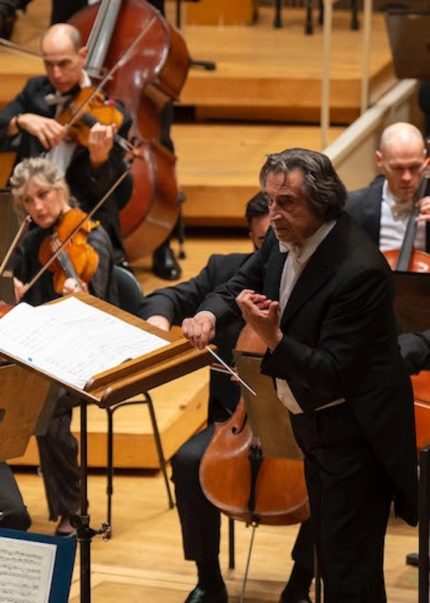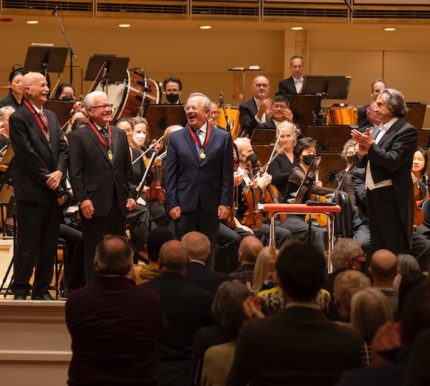Muti draws fresh, powerful results with new music from old composer friends

A program of Rossini, Mozart and Prokofiev may not exactly set the pulse racing, at least on paper.
But the second week of the Chicago Symphony Orchestra’s 132nd season brought a stellar concert Thursday night, with Riccardo Muti drawing fresh and powerful results in music from three favored composers. It’s also significant that two of the works were new to Muti’s Chicago repertory in this, his final season as music director.
The Overture to Rossini’s rarely performed opera Il viaggio a Reims is a mystery work. Lost for over a century, the score resurfaced in 1938, but recent scholarship has cast doubt on its authenticity—not only as a curtain-raiser for said opera but whether it was written by Rossini at all. That murky provenance may account for the Overture’s neglect, with Thursday night’s performance marking its first CSO outing since Jean Martinon last led it in 1963.
But this Overture is a gem, a wonderful eight-minute comic distillation, which, if not by Rossini, was written by the greatest Rossini impersonator in history.
Muti led a witty, infectious and wholly delightful performance, from the brash opening flourish to William Welter’s keening oboe solo and Stephen Williamson’s burbling clarinet interjections, with Muti milking the false ending for all it’s worth.
Apart from accompanying concertos, music of Mozart has figured less prominently in the second half of Muti’s tenure than in his first. The evening’s performance of the Symphony No. 39 showed Muti’s Mozart at its most distinctive.
This was characteristically Viennese Mozart, as led by Muti: tonally refined, deftly scaled—even with healthy-sized string sections—and generous with repeats. From the flowing introduction, the performance ideally blended vigor and grace. Nothing was tense or overdriven and the score unfolded with a sense of Classical poise and inevitability. The Andante went with affectionate galant expression—no Apollonian chill here—followed by apt bustle in the Menuetto with Williamson’s bumptious clarinet lending rustic color in the trio.
The main theme of the finale is one of Mozart’s happiest inspirations, and the performance mined the good humor without losing an essential gracious quality. Mozart playing—and conducting—doesn’t get much better than this.
Prokofiev’s Symphony No. 5 closed the evening in what was, surprisingly, Muti’s first Chicago performance of the work.
Written in 1944, the Fifth is a wartime work that transcends its time and place. Prokofiev’s contemporary statements on the symphony (representing “the free and happy man” and “his strength, his generosity and the purity of his soul”) ring a bit hollow today and feel like home-front tub-thumping in a dire national era. Yet the Fifth remains Prokofiev’s greatest symphony, a work of vast power and emotional depth—not always the case with this sometimes-facile composer. The symphony is quirkily individual and masterfully scored, a retrospective look back at mechanistic Russian Futurism blended with Prokofiev’s brand of unsentimental lyricism.
As with the Rossini and Mozart on the first half, Thursday night’s performance was richly idiomatic. If the string-dominated textures in the opening movement rounded off some of the spikier elements, Muti had a sure sense of the movement’s scale, building patiently to the gong-clanging climax with eruptive force. Conversely, the ensuing Allegro marcato was taken at a brisk pace, emerging, aptly, as more nerve-wracked than jaunty or cheerful. More than usual, Muti made the kinship between the brooding Adagio and Prokofiev’s recent ballet music for Romeo and Juliet manifest.
The insistent main theme of the finale went with all due momentum, led off each round by Williamson’s insouciant clarinet riff. As throughout balancing was impeccable with every wind line and strand of rattling/shimmering percussion audible. Muti ratcheted up to the coda with ominous inexorability, the faux triumph upended in dislocating fashion, as the whirring machine continued to spin out of control.
_________

Seven longtime CSO musicians have retired, many over this past summer, and three of those players were recognized on stage Thursday night.
At the top of the second half, Muti presented the Theodore Thomas Medallion, awarded to retiring CSO members, to bassoonist Dennis Michel, violinist Paul Phillips Jr., and assistant principal oboe, Michael Henoch. Also retiring is violinist Fox Fehling.
Muti thanked the three musicians “for the joy that you gave me making music for so many years together.” He added that musicians never really “retire.”
“Remember, they physically do not sit in the orchestra, but their work, their passion, their talent, their music-making remains,” said Muti. “It’s in the walls, in the chairs, in the orchestra, everywhere. I believe that your work has been absorbed in the years, by this ambience, by the musicians.
“Your experience, your tradition, your talent has been very important, and will be very important for the new generations…..I will miss you, but I hope that you will come back sometime when it is possible for you to enjoy the music of your colleagues that love you as I love you and have loved your playing,”
The program will be repeated 1:30 p.m. Friday and 8 p.m. Saturday. cso.org
Posted in Performances





